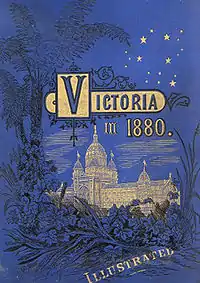Garnet Walch
Garnet Walch (1 October 1843 in Broadmarsh, Tasmania – 3 January 1913 in Melbourne), was an Australian writer, dramatist, journalist and publisher. The youngest son of Major J.W.H. Walch, of H.M. 54th Regiment, [1] he went on to become the most popular, and arguably the most successful, writer for the Australian stage during the 1870s and 1880s, While many of his works were localised and updated adaptations (notably his pantomimes), it was his ability to tap into the public's mood and desires by expressing sentiments and making satirical allusions that made his works so popular. Walch wrote a wide array of genres and forms, including "serious" dramatic works, comedies, pantomimes, burlesques, melodrama, and comediettas.[2]

Throughout his career as a dramatist, Walch wrote for and collaborated with many of Australia's leading theatre industry practitioners of the period. His list of creative associations reads like a Who's Who of late 19th century Australian theatre: Harry Rickards, George Darrell, Alfred Dampier, Richard Stewart, William Saurin Lyster, J.H. Rainford, Mrs G.B.W. Lewis (aka Rose Edouin), and Alfred Sylvester to name but a few. He also wrote works for the Melbourne Theatre Royal's fluid management of Henry R. Harwood, Richard Stewart, J.R. Greville, John Hennings, and George Coppin, as well as for J.C. Williamson and scenic artist-turned manager W.J. Wilson. Several high-profile actors also benefited from Walch's keen writing talents, none more so than Bland Holt. Further to this, several of his works were adapted by others, including Archibald Murray's Harlequin Blue Beard, The Great Bashaw (1872); Samuel Lazar's Hey Diddle Diddle The Cat and the Fiddle, the Cow Jumped Over the Moon (1878); and the burlesque Sinbad the Tailor (1881), adapted from Walch's 1880 pantomime Sinbad the Sailor. Walch's non-music theatre works include "Heart and Head" (sketch, 1881), Proof Positive (comedietta, 1883), and possibly the Harry Rickards-produced comic play In A Fog (1890). [3]
In addition to his theatre work Walch was secretary to the Melbourne Athenaeum between 1873 and 1879.[4]
As a publisher, his most outstanding work was Victoria in 1880, a de luxe book with lavish engravings by Charles Turner, compiled by Walch and published by George Robertson in Melbourne, celebrating the 1880–1881 International Exhibition. The book was inscribed to The Honourable William John Clarke, President of the Victorian International Exhibition Commission.
In 1883 he went to Madagascar as special correspondent for the Argus and the Australasian.
Family
Walch married Ada Kate Ellard (died 13 July 1921) Their children included Kittie, Lizzie, Emily Clairellen ("Clair"), Albert Henry (died 28 May 1923), and Richmond. They had a home "Rubra" on Mont Albert Road, Mont Albert, Victoria.[5]
Selected works
- Jack the Giant Killer or, Harlequin Fe-Fi-Fo-Fum, the Demon Spider and the Fairies of the Silver Lake (1891)
- The Trapper (1891) – with Alfred Dampier
- The Scout (1891) – with Alfred Dampier
- The Miner's Right (1891) – with Alfred Dampier
- Robbery Under Arms (1890) – with Alfred Dampier
- The Count of Monte Cristo (1890) – with Alfred Dampier
- Sleeping Beauty or, Harlequin Mother Goose and the Seven Champions of Christendom (1885)
- Bric-a-Brac, a musical comedy in two acts (1885)[6]
- Dyk Whyttyngtonne and Hys Catte or, Arlekyn Lyttel Bo-Peepe and Ye Faerie Chymes of Bowe-Bells (1881)
- Gulliver or, Harlequin King Lilliput (1881)
- Sinbad the Sailor; or The Pet of the Pearl; The Old Man of the Sea; and the Dwarf of the Diamond Valley (1880)
- The Babes in the Wood (1879)
- Helen's Babies (1877)
- Beauty and the Beast, or Harlequin King Glorio the Millionth, the Island of Apes, and the Fairies of the Magic Roses (1875)
- Adamanta, the Proud Princess of Profusia, and her Six Unlucky Suitors (1874)
- Australia Felix or, Harlequin Jackass and the Magic Bat (1873)
- Orpheus (1872)
- Trookulentos, the Tempter or, Harlequin Cockatoo, the Demon of Discontent (1871)
- Prometheus or, The Man on the Rock (1870)
- Conrad the Corsair or, Conrad and Medora (1870)
References
- "Family Notices". The Mercury (Hobart). Vol. XCVIII, no. 13, 345. Tasmania, Australia. 6 January 1913. p. 1. Retrieved 20 September 2022 – via National Library of Australia.
- Clay Djubal. "Garnet Walch". Australian Variety Theatre Archive. Accessed 5 September 2023.
- Clay Djubal. "Garnet Walch". AustLit: Discover Australian Stories. Accessed 5 September 2023.
- "Australiana: Garnet Walch". The Argus (Melbourne). No. 30, 654. Victoria, Australia. 25 November 1944. p. 7 (The Argus Week-end Magazine). Retrieved 31 March 2019 – via National Library of Australia.
- "Family Notices". The Argus (Melbourne). No. 23, 383. Victoria, Australia. 14 July 1921. p. 1. Retrieved 20 September 2022 – via National Library of Australia.
- "Cockney Comic Gave Us Our Golden Age Of Vaudeville". Truth (Brisbane newspaper). No. 2797. Queensland, Australia. 1 November 1953. p. 17. Retrieved 21 September 2022 – via National Library of Australia.
External links
- "Garnet Walch (1843-1913"). Biography at the Australian Dictionary of Biography
- "Promotional Literature 12. Walch, Garnet, 1843-1913. Victoria in 1880. Tourism in Australia Exhibition, Monash University, 2003-2004.
- "Garnet Walch". Biography at the Australian Variety Theatre Archive.
- "Garnet Walch". Biography at the AustLit: Discover Australian Stories.